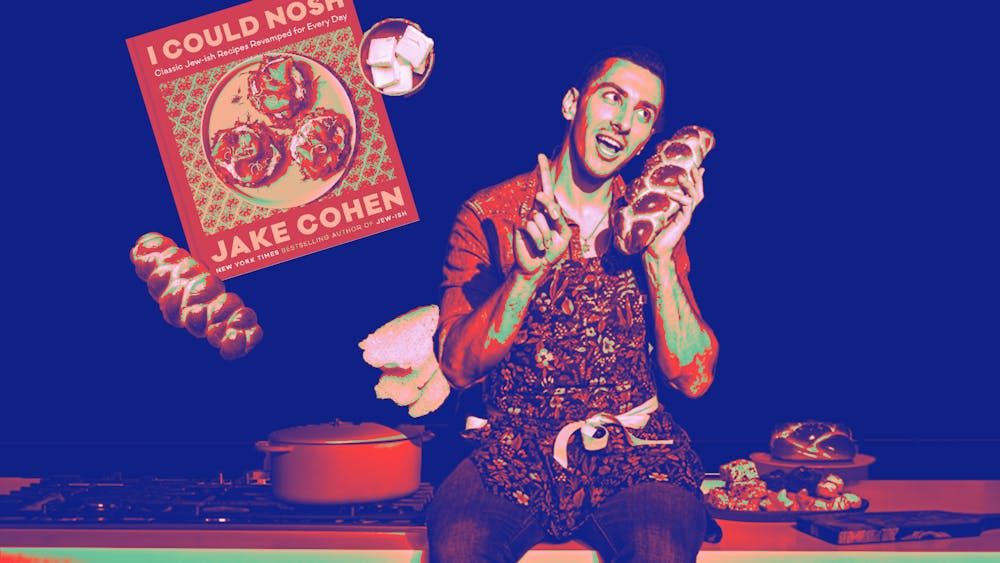What does it mean to be kosher? How can our family recipes enter mainstream culinary canon? How much is a yahrzeit glass? Heck, what does it mean to be a Jew today?
Between laughs and stories, a distinctly Jewish conversation was had at the Weitzman National Museum for American Jewish History on the evening of Sept. 28. We gathered to celebrate, contemplate, and of course consume “modern Jewish cooking and baking” in all its glory. The event was hosted by two titans of the food world—four–time James Beard awarded chef and restaurateur Michael Solomonov and New York Times bestselling author, social media personality, and self–acclaimed "nice Jewish boy" from NYC Jake Cohen—along with comedic relief courtesy of stand–up comic and writer Alex Edelman. The special gathering commemorated the release of Cohen’s sophomore cookbook I Could Nosh: Classic Jew–ish Recipes Revamped for Every Day.
“Starting at matzah, everything we know as Jewish food was modern at some point because of where we moved, and it just happened to be based on war and strife and persecution and fleeing,” said Cohen as the bubbe beside me stuck out her hand to offer me a hard candy. “But with that came these new traditions, these new ingredients, these new ways that we incorporated the foods around us and made them adapt to Shabbat or the holidays.”
Many of Cohen’s recipes are inspired by his own Ashkenazi heritage as well as his Iraqi Jewish husband’s grandmother’s recipes, with two particularly popular dishes being his Iraqi roasted salmon and Hadji Bada almond cookies. For Solomonov, this is particularly important, and not just for the purpose of impressing Cohen’s in–laws: “Baghdad was at one point over 50% Jewish and there are zero Jews right now. [Iraqi Jewish food] doesn’t exist in Baghdad and it doesn’t exist in Iraq,” he said. “So the only way for this 'l’dor vador, Jewish hand–me–down' thing is really by cooking and for you, by marketing this to a much larger audience.”
This dynamic in Jewish cooking exists beyond Iraq, with Cohen and Solomonov both touching on further examples. Once–vibrant Jewish communities in Europe like Budapest are now eerily empty and sites of culinary tradition lost at the hands of the Shoah, they explain. Solomonov says that ingredients like mushroom, berries, and geese, for example, were popular in this region but didn’t cross the Atlantic not only because of the mass loss of life, but also because of the extreme poverty of those who did immigrate. As such, Ashkenazi food took the form that we know today with dishes like knishes, blintzes, tzimmes and more.
But what is glamorous about gefilte fish? “I think the last generation was embarrassed,” Solomonov says. Cohen, in both of his cookbooks and beyond, has made it part of his mission to reinvigorate an excitement and joy for the food of his people. He notes that Jewish food, whether Israeli, Yemeni, Polish, or even Indian is something that we can take pride in and that can be “hot, vibrant, and colorful.”
Cohen’s new cookbook I Could Nosh as well as Solomonov’s beloved eateries like Zahav undoubtedly achieve this pridefulness. At the end of this conversation sprinkled with Yiddish, belly laughs, and candid stories so funny that at one point Solomonov spit out his water, the audience had a tangible sense of passion and gratitude. Beyond this, of course, everyone was ready for a little nosh—challah grilled cheese and harissa tomato soup made from recipes in Cohen’s cookbook were served to conclude the evening.







